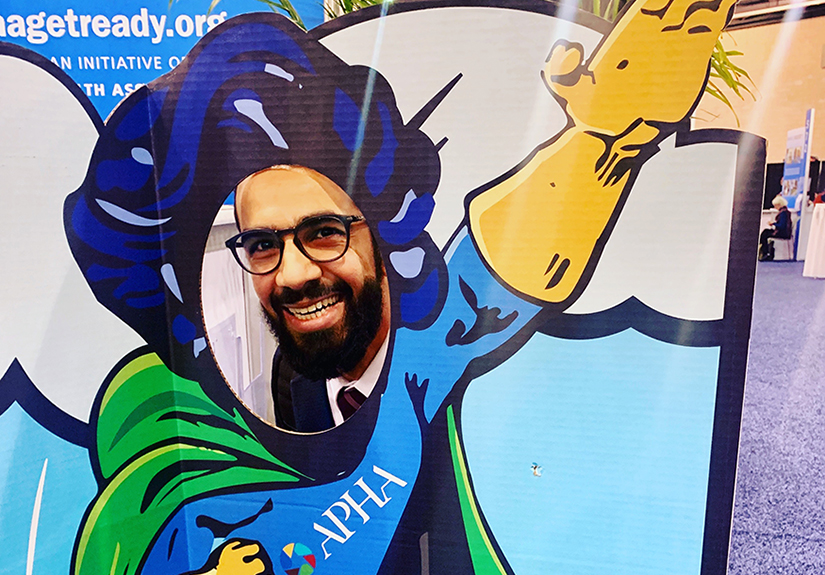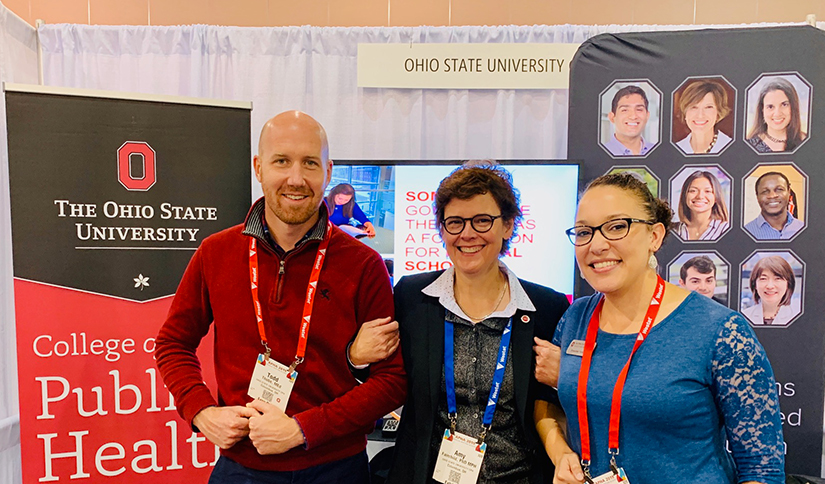APHA 2019 a time to highlight research, connect and learn
PHILADELPHIA – The College of Public Health was well-represented – and recognized – at this month’s annual meeting of the American Public Health Association.
By Misti Crane

Students, alumni and faculty shared research on topics including how sleep could contribute to suicide risk, how hospitals can better prevent Legionella and how messages encouraging smokers to stop might be reframed to emphasize the positive sides of quitting.
Among the highlights:
- Doctoral student Mahmood Alalwan’s poster on sexual minority youth, violence and the associated risks won first prize. He found that sexual minority youth who experienced sexual violence have a higher prevalence of poor mental health effects compared to their heterosexual counterparts. This work could help guide interventions to support these young people and prevent suicide, he said.
- Medical student Kirsten Boone, who worked with Interim Chair and Associate Professor of Epidemiology Maria Gallo, received top student abstract honors for her work looking at the relationship between diabetes and an early stop to breast feeding. She found no connection, but did note other interesting relationships, including data showing that women who participate in WIC have a higher likelihood of stopping breast feeding early.
- Dean Amy Fairchild helped to unveil the new Public Health Code of Ethics, a blueprint for the field. Fairchild said that she hopes it aids in “really addressing our shared fate in a profound way.”
 Dean Amy Fairchild with graduate program recruiters Todd Thobe and Shauntae Yakasky
Dean Amy Fairchild with graduate program recruiters Todd Thobe and Shauntae Yakasky
Other CPH presenters included Kelly Bragg, program manager in the Center for Public Health Practice, on a community partnership in Marion County; Julianna Nemeth, assistant professor of health behavior and health promotion, on a research collaboration with the Ohio Domestic Violence Network that has led to broader recognition of brain injury in domestic violence survivors; Liz Klein, interim chair and associate professor of health behavior and health promotion, on work examining how people respond to different smoking-cessation messages; doctoral student Li Li on her work looking at teens who drive after using marijuana; alumna Rachel Czerny on her work looking at wellness champion networks; alumna Alexis Mraz on her work exploring Legionella prevention; CPH-PEP student Ann Robinson on the Nisonger Center’s disability education project with the College of Medicine and graduate student Lucas Neuroth on a study showing that far too little and far too much sleep could both increase suicide risk in teens.
The College of Public Health also welcomed about 70 guests to its APHA reception, where college faculty and staff enjoyed meeting and reuniting with alumni, students and other friends of the college.
About The Ohio State University College of Public Health
The Ohio State University College of Public Health is a leader in educating students, creating new knowledge through research, and improving the livelihoods and well-being of people in Ohio and beyond. The College's divisions include biostatistics, environmental health sciences, epidemiology, health behavior and health promotion, and health services management and policy. It is ranked 22nd among all colleges and programs of public health in the nation, and first in Ohio, by U.S. News and World Report. Its specialty programs are also considered among the best in the country. The MHA program is ranked 5th and the health policy and management specialty is ranked 21st.